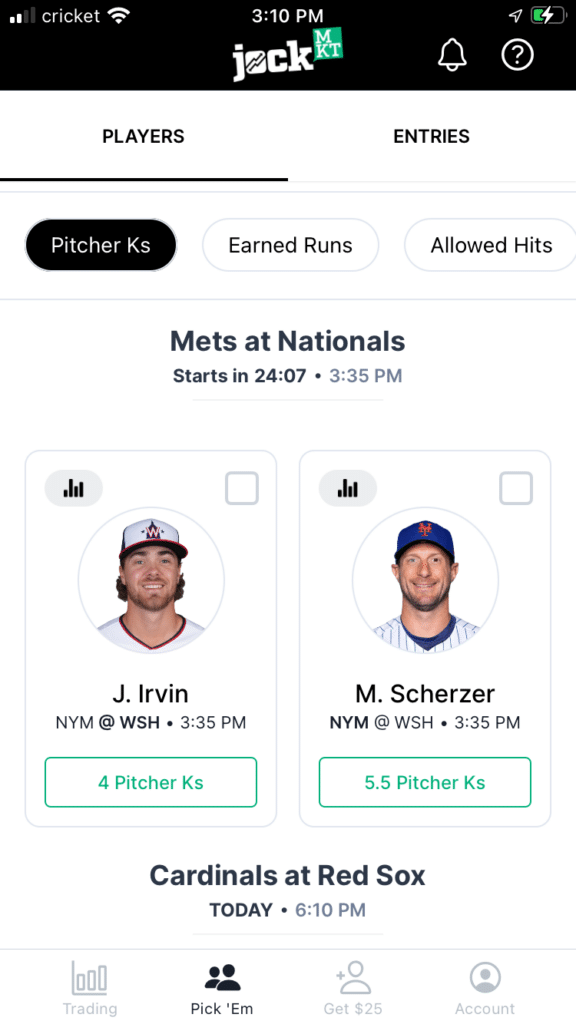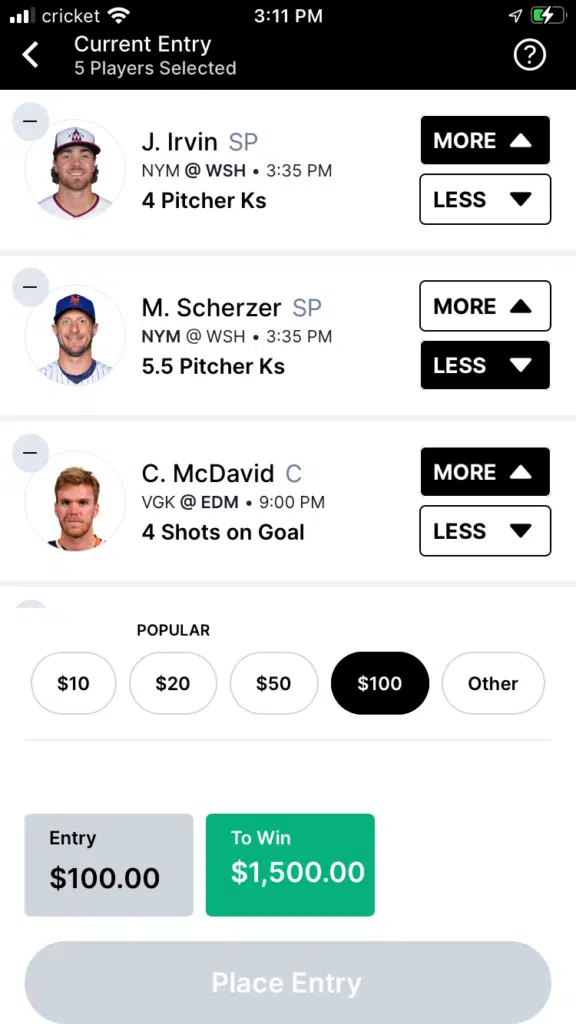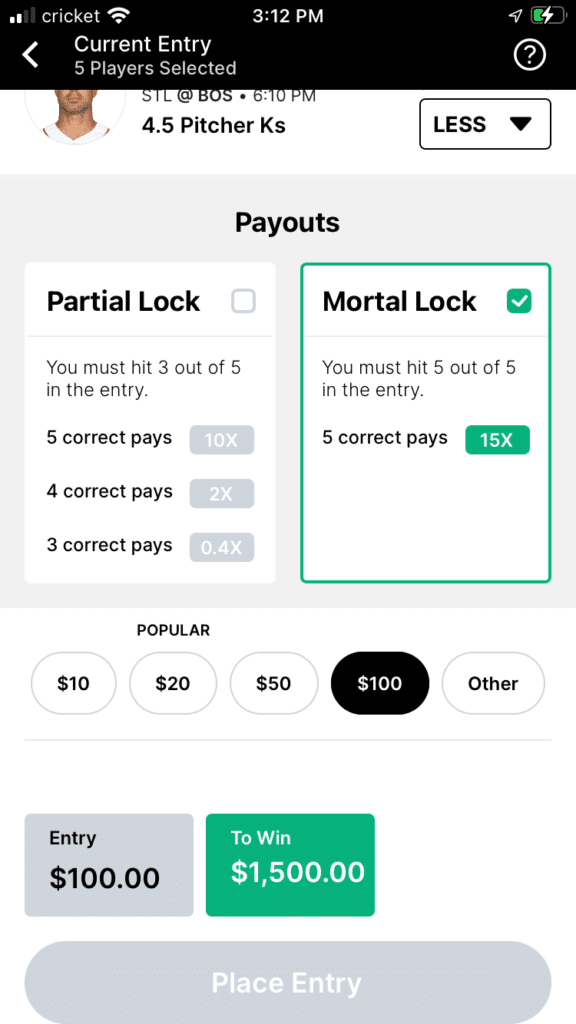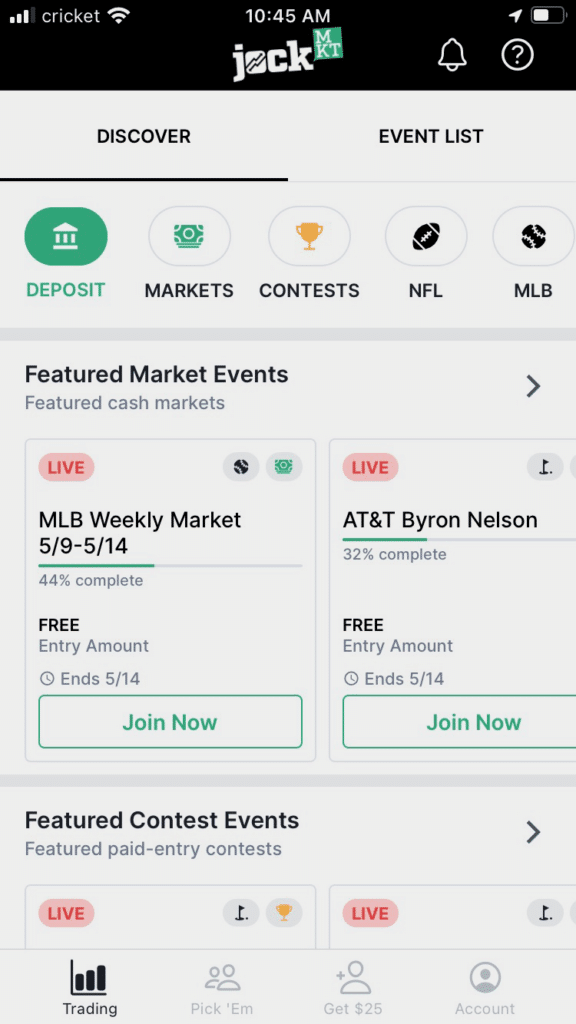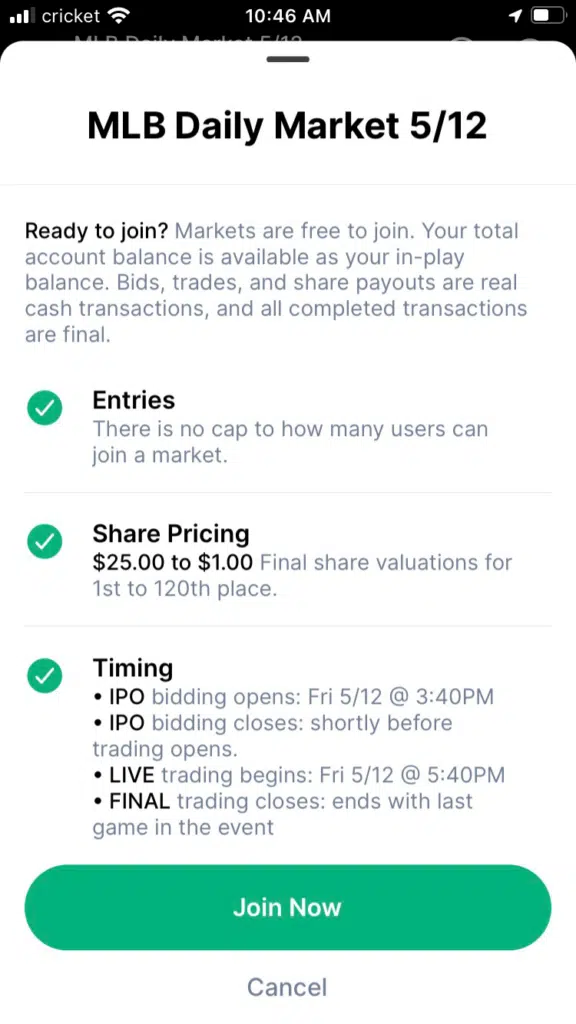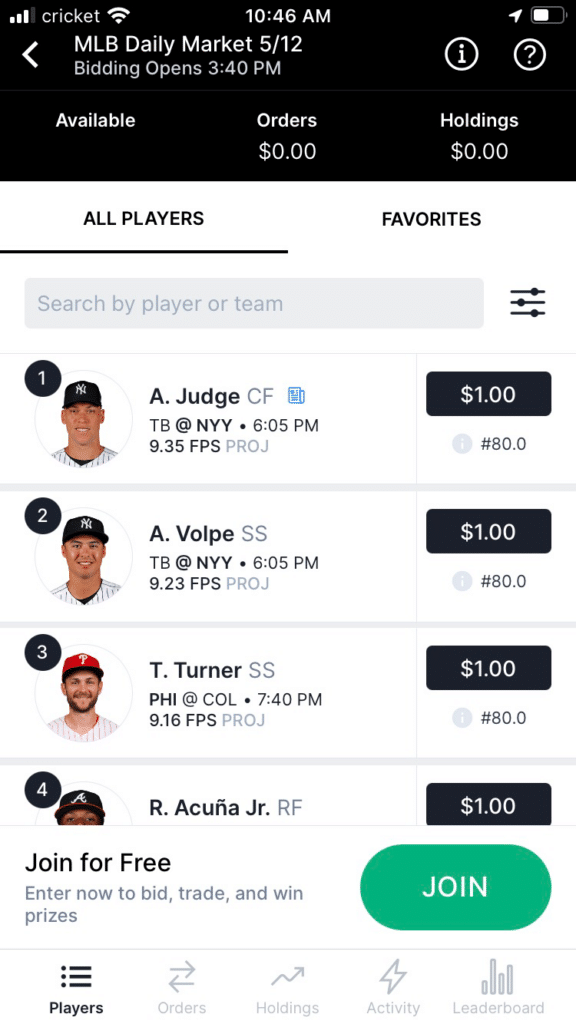Jock MKT Review (CLOSED)
Editors Note: Jock MKT is no longer operational. BettingUSA had concerns regarding the business and advised readers to avoid Jock MKT even before it closed. Fortunately, Jock MKT closed in an orderly fashion and transferred customers’ account balances to competing fantasy sports site Splash Sports.
Jock MKT was a fantasy sports exchange where fans bought and sold real-money shares in athletes during daily and weekly contests. It was a lot like the stock market but with shares in athletes instead of public companies.
Share values were determined by each athlete’s fantasy points total and prevailing market sentiments. And, just like the stock market, the goal was to buy low and sell high. Fans could win money through trading alone or via paid tournaments for fixed payouts.
If you bought cheap shares in an underrated backup quarterback who went on to light up the defense for two touchdowns in the second quarter, you would see your share values soar and decide if you wanted to sell now to lock in your profits or let it ride.
Which States Is Jock MKT States Legal In?
Jock MKT was not the first sports exchange to hit the US market, but it differed from all others in one fundamental respect: Jock MKT was legal in most US states because it based athlete values on fantasy points. It felt like a sports betting exchange but qualified as daily fantasy from a legal standpoint.
States where the Jock MKT app operated:
- Alabama
- Alaska
- Arkansas
- California
- Colorado
- DC
- Florida
- Georgia
- Illinois
- Kansas
- Kentucky
- Massachusetts
- Minnesota
- Mississippi
- Nebraska
- New Hampshire
- New Jersey
- New Mexico
- New York
- North Carolina
- North Dakota
- Ohio
- Oklahoma
- Oregon
- Pennsylvania
- Rhode Island
- South Carolina
- South Dakota
- Texas
- Utah
- Vermont
- West Virginia
- Wisconsin
- Wyoming
Note: Fans located in Arizona, Connecticut, Delaware, Hawaii, Idaho, Indiana, Iowa, Louisiana, Maine, Maryland, Michigan, Missouri, Montana, Nevada, Tennessee, Virginia, and Washington State could sign up for accounts but could only participate in contests and tournaments without prizes.
Jock MKT Promo Code And Bonus Offer
New Jock MKT customers could claim a 100% first deposit bonus worth up to $100 with the promo code BUSA. The offer was available to all new users who registered and deposited $20 or more.
Claiming the Jock MKT bonus was a slightly different process than usual. Unlike most fantasy sites and online sportsbooks, Jock MKT did not ask for a bonus code upfront during registration. Instead, users entered their bonus codes after depositing.
Jock MKT Game Types
Jock MKT was best known for its trading-style contests, but it also offered two game types that did not involve live trading:
- Pick’em Contests: Easiest game type to understand; anyone could pick it up and play. In pick’em contests, players selected two or more athletes and predicted how well they would perform on game day to win up to 15x their buyins. Pick’em contests were played against the house, felt like parlay wagers, and did not involve trading.
- Market Games: Market games were the closest thing to trading on the stock exchange. Each market game covered a slate lasting one day to one week, and players could jump in any time to buy and sell athletes. There was no fixed buyin or tournament-style payout structure. Instead, players had their entire cash balance available, and their only goal was to make money by executing intelligent trades.
- Contests: In contests, players paid a fixed buyin and traded with chips instead of cash. At the end of the contest, players were ranked according to their ending chip balances and received tournament-style payouts.
- IPO Only: IPO Only games resembled regular daily fantasy contests because they required buyins and only involved the IPO (initial player offering). Contestants bid on athletes at the start of the contest, but there was no live trading once the slate’s first game began. As a result, it was like building a lineup – you got a fixed number of starting chips, used that to bid on athletes, and watched the results roll in.
Market games were like poker cash games in that they did not involve buyins, players could come and go as they wish, and they executed all trades with cash. Continuing the analogy, contests were like poker tournaments in that players paid a buyin, traded with chips, and tried to earn payouts by finishing with a larger chip balance than everyone else.
How Jock MKT Worked: Jock MKT Explained
In Jock MKT contests and market games, players bought and sold shares of athletes in real-time during one-day or one-week slates.
Jock MKT differed from most fantasy sports sites because it did not involve building lineups and getting paid based on how many fantasy points your athletes collectively earned. Instead, Jock MKT used each athlete’s fantasy points total to determine their share values at the end of the slate.
The key to understanding how Jock MKT worksed is to understand the three phases of every game:
- The IPO (Initial Player Offering): Each contest began with the IPO. Customers bid on athletes to buy shares in them. The bidding action determined share prices.
- Live Trading: During the contest, players bought and sell shares in athletes. Prices were determined entirely by the market. Generally, share prices in athletes who were performing well increased, while shares in athletes who were performing poorly decreased.
- Final Valuations and Payouts: At the conclusion of the contest, athletes were ranked according to their fantasy point totals, and their shares received valuations based on their positions in the rankings (more on that below). Any players still holding shares at the end of the contest received payouts equal to those shares’ final valuations.
In short, the better each athlete performed, the higher their share value. For example, if a player bought shares in an athlete who went on a hot streak, the share price increased, and the player could sell those shares at a higher price to earn a profit. Likewise, a player who bought shares in an athlete who underperformed would usually have to sell for a loss.
This is how Jock MKT was like a stock exchange. It was like buying shares in a company and watching the stock price increase as it expands, except Jock MKT was all about buying shares in athletes.
Jock MKT IPOs Explained
All contests and market games began with IPOs (initial player offering) in which customers bid on shares in athletes.
At the end of the IPO and just before the slate’s first game began, the highest bidders received their shares. After the IPO ended, the game switched to live trading, and players could begin buying and selling shares on the market.
Athlete Share Prices Explained
Like any stock exchange, the market decided athlete share prices based on supply and demand.
At the end of a slate, Jock MKT ranked all athletes according to the number of fantasy points they earned and assigned predetermined, rank-based valuations. For example, here’s the valuation structure from a random MLB slate at Jock MKT:
- 1st (athlete with the most fantasy points): $25 per share
- 2nd (athlete with the second-most fantasy points): $20 per share
- 3rd (athlete with the third-most fantasy points, etc.): $18 per share
- 4th :$16 per share
- 5th: $15 per share
- 6th: $14 per share
- And so on down the rankings
A total of 200 athletes participated in this slate’s games, and positions 1 through 99 finished with share values ranging from $25 in first place to $1.05 for 99th place. The remaining athletes down to 200th place finished with final valuations of $1.00.
Jock MKT sets and published predetermined valuations for each finishing position before the contest began, but it did not set prices for the athletes themselves. That was the market’s job.
In other words, everyone knew the athlete who finishes first in fantasy points would be worth $25 per share, but nobody knew for sure which athlete that would be until the contest concluded.
During contests, players bought and sold shares in athletes with that information in mind. If an athlete was racking up fantasy points, his share price would rise as players anticipate about where that athlete would finish in the final standings.
How Jock MKT Market Games Worked
In market games, players tried to profit by buying and selling shares with other players using cash. Market games had predetermined start and end times but were free-for-all events otherwise. There were no buyins or tournament-style payouts like in contests at other DFS sites.
Players could enter market games for free anytime and spend whatever they wanted on shares. Once they had shares, players could either sell them on the market during the game or hold them until it concluded.
For example, if a player bought shares in an athlete at $8, and the price rose to $12, that player could either sell them on the market for a $4-per-share profit or hold them until the end of the game.
Players who opted to hold their shares until the end of the game received per-share payouts equal to the athlete’s final valuation. Continuing the above example, if the athlete finished fifth in fantasy points earned and received a $15 valuation, the player would receive $15 per share.
How Jock MKT Contests Worked
In Jock MKT contests, players paid fixed entry fees, received chips to trade with, and competed for tournament-style payouts. Instead of trading with cash, players traded with chips.
At the end of a Jock MKT contest, players were ranked according to their chip stacks and received fixed payouts for their finishing positions. The player with the most chips would win the first-place prize, the player with the second-most chips would win the second-place prize, and so on.
Jock MTK hosted multiple free-to-play contests with cash prizes every day, allowing anyone new to the concept to try trading without spending any money. The prizes were modest, but free Jock MTK contests were an excellent low-risk way to learn the ropes.
Shorting Athletes on Jock MKT
If you thought an athlete’s price would fall, you could sell shares in that athlete on the market without owning any shares. Later, you would have to buy back shares in that athlete to close the position.
Shorting was essentially borrowing shares from Jock MKT, immediately selling them, and agreeing to buy them back later to close the position – hopefully at a lower price than you sold them for earlier.
For example, if an athlete was currently going for $15 on the market, and you thought the price would fall, you could short ten shares to receive $150. If the athlete’s share price later fell to $5, you could close the position by purchasing ten shares for $50, securing a net gain of $100.
Of course, shorting could also work against you. For example, if you shorted an athlete at $10 and the price was $25 when you closed the position, you lost $15 per share.
You could close your short position by either buying shares on the market or waiting until the contest ended. If you had an open short position at the end of the game, you would close it by buying shares at the athlete’s closing price.
Note: Jock MKT placed a $25 hold on your account for each share you shorted while the position was open. That was the maximum athlete price, and the hold ensured you couldn’t go negative while shorting.
Jock MKT Pick’em Contests
Fans who found trading too time-intensive or stressful could take a break to try Jock MKT’s pick’em contests for an experience that was fast, simple, and potentially high-paying.
In pick’em contests, players selected 2-5 athletes, answered one over/under question for each, and chose a buyin. For example, a player may select a golfer and predict whether that golfer would finish the round with more than or fewer than 67 strokes. Similarly, a player might choose an MLB pitcher and predict whether he would have more than or fewer than 4.5 strikeouts.
The more athletes you selected, the higher the potential payout. Mortal Lock pick’em games provided the largest payouts but required players to answer every question correctly or they lost.
- Two athletes and two correct picks: 3x your buyin
- Three athletes and three correct picks: 6x your buyin
- Four athletes and four correct picks: 10x your buyin
- Five athletes and five correct picks: 15x your buyin
Partial Lock contests offered consolation prizes for players who only got some of their predictions right, but they offered smaller maximum prizes:
- Three athletes and three correct picks: 2.25x your buyin
- Three athletes and two correct picks: 1.25x your buyin
- Four athletes and four correct picks: 5x your buyin
- Four athletes and three correct picks: 1.5x your buyin
- Five athletes and five correct picks: 10x your buyin
- Five athletes and four correct picks: 2x your buyin
- Five athletes and three correct picks: 0.4x your buyin
Jock MKT Deposit Methods
Players could fund their accounts via:
The only withdrawal method was an ACH transfer directly to players’ bank accounts.
Jock MKT App Review
Fans could download the Jock MKT app for iOS and Android or visit the mobile-friendly website at jockmkt.com from any mobile device with no download necessary.
The Jock MKT trading concept involved a lot of moving parts by necessity and asked a lot of the app. Nonetheless, the Jock MKT mobile app was easy to use and ran smoothly. During this review, BettingUSA had no issues launching the app, browsing the various game types, and exploring.
The Jock MKT app’s strong points included:
- Info tips spread liberally throughout the interface to define acronyms, offer advice, explain features, and point to additional resources for more details
- Getting started guides and videos placed prominently on the app’s homepage
- Minimal load times and fast updates
- Various sort and filter features to view games by sport, buyin if applicable, type (market vs. contest vs. pick’em)
- Athlete pages that provided current pricing info, allowed users to view potential profits/losses at various prices, past pricing info, in-game stats like yards gained/strikeouts/birdies/etc., past game logs, and news updates from RotoWire
- Contest overview pages where players could view fantasy point scoring rules, final valuations at each rank, trading fees, and more
The app usually did a good job labeling and explaining features, but it was not always clear how to accomplish some tasks.
One example is that when viewing all available athletes during a game, it was unclear how to view current info versus how to view the athlete’s in-game stats and news updates. The difference was about an eighth of an inch between tapping on the athlete’s profile picture versus tapping the athlete’s name, without any labeling indicating as such.
That said, Jock MKT outperformed most other DFS apps in functionality and ease of use. In summary, the Jock MKT app did a lot of heavy lifting while making it look easy.
Jock MKT Customer Support
Jock MKT customer support was so-so. The Jock MKT website and app provided useful self-help guides with FAQs that answered the most common questions, but the only way to contact the support team was via e-mail at contact@jockmkt.com.
BettingUSA sent a test e-mail to the support team at around 7:30 PM one evening and received a response the next morning, about 12 hours later. Although Jock MKT didn’t list specific hours support is available, the results of the test e-mail indicated support only being available during business hours.

